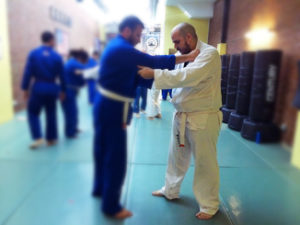
Laundry was never one of my strong suits.
I always used to wait until I was completely out of some crucial piece of clothing to get around to it, and then it was a huge ordeal because I had to lug multiple loads downstairs and worry about whether there would be enough open machines, and spend way too long just moving everything from the washers to the dryers.
And then, oh god, the folding. 🙂
Since I started jiu jitsu, I’ve gotten into the habit of doing a load of laundry every morning. Things don’t pile up, I always have a wide assortment of black t‐shirts and jeans to choose from, and my gis… well, they could smell worse.
It seems like a silly thing, but it’s indicative of a big shift in my habits and self‐discipline. At first, I did it grudgingly every other day, because it was either that, skip class, or wear a dirty gi, and I really didn’t want to choose the last two. Now it’s just part of my morning routine – start a pot of coffee, walk the dog, take the laundry down, grab some breakfast, deal with my email, switch the load to the dryer, do a 30‐minute yoga routine, pull the laundry out before it gets overcooked, settle in for the work day. I’ve never really had a consistent routine like that until this year.
And it feels weird if I don’t have anything to wash.
It’s not just day to day habits that I’ve seen improvements in. Obviously my fitness level is hugely improved over where I was when I started. I’m also happier and more confident. I’d rather go out with friends than stay home and play video games. I see visiting a new BBJJ school as a chance to meet and learn from cool new people rather than the awkward and intimidating social scenario it would have seemed to me before.
I don’t even fight with my sister anymore, which I have for years – I’m able to just take the little jabs she throws at me in stride and keep the conversation flowing, which I feel is a perfect reflection of the mindset that rolling with training partners instills in us. If you’d known me a year ago, you’d know these are massive changes in my outlook and priorities.
And then there’s the training itself. I threw myself in the deep end without really thinking too much about it when I first started in the advanced program. I noticed after a couple of weeks of classes that I was often the only white belt in randori sessions, which meant I got a ton of time training with blue and purple and brown belts. Now I’m a big guy, but there are plenty of smaller blue belts here who are still able to choke me more or less whenever they feel like it. I love it, because it constantly reminds me that these techniques work, and that I’m still a baby who’s just figuring out how to walk in this world.
So I was honestly shocked recently when I had the chance to roll with some of the newer white belts and got
to see what that feels like from the other side. I knew I’d been improving, because I wasn’t getting
submitted as often and felt like I had a pretty good understanding of what was happening at any given
time during a roll. But then one of my Thai boxing training partners who recently started in the BJJ
program started going super hard trying to pass my guard. I was totally relaxed, able to keep him at a
comfortable distance, let him tire himself out a bit, and then was easily able to sweep and armbar him.
It was eye opening, because this is a guy who knows how to fight standing up, who’s in great shape, and
who was really trying to win, and the techniques came so naturally and worked so well. It was so cool to
see because I know that’s how I was at first (minus the being in shape and knowing how to fight parts),
and I know that’s about the level of challenge I present to a purple belt at this point. All this inside of twelve months.
I can’t wait to see how my perception – of myself and the training – changes in my second year of training.
Mike began his training at Brooklyn Brazilian Jiu-Jitsu in 2016. He is a fixture in both Jiu-Jitsu and Kickboxing at BBJJ Clinton Hill, along with his wife Rachel.





